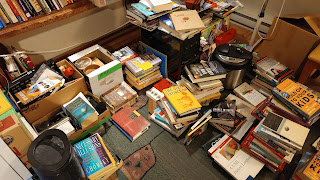The Plague of Books
I have accumulated way too many non-fiction books. So why don't I just read them and pass them on?
It turns out that learning useful information by from most books is massively inefficient. Most non-fiction authors don't write handbooks or reference materials, the kind that are dense with information. Instead, they sprinkle a few key points - less than a couple of pages worth - over two hundred pages. The other 198 pages are often well-written and interesting and insightful and personal. A perfect example is James Lovelock's "The Ages of Gaia". I found myself digging through pages of chatty personal opinion to find out simple information on how the history of our atmosphere matches the geological record.
The problem is human memory: we don't easily sort out and memorize
the critical insights, the ones that fit with other knowledge and give us new tools for understanding humanity and the world around us. Instead we remember the narratives, the stories, pretty much the same stuff that good fiction features.
It's not an accident that the really good books on my shelf have yellow stickies at the key points and it's not an accident that there is a whole discipline devoted to the problem of knowledge management.
And it's not an accident that in spite of a biblical flood of printed information, human societies struggle with problem after problem.
********




Comments
Post a Comment